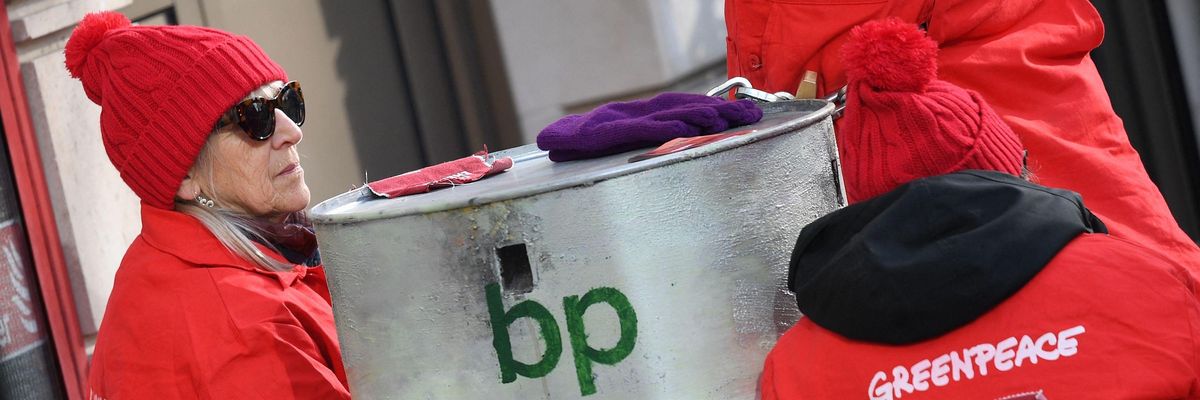British Prime Minister Boris Johnson's conservative government came under fire Tuesday for its refusal to impose a windfall tax on oil and gas giants after BP posted its highest quarterly earnings in more than a decade.
The London-headquartered energy company announced an underlying replacement cost profit of $6.2 billion for the first three months of 2022, well above the $2.6 billion it posted the same period last year and beating the $4.5 billion expected by market analysts.
BP attributed the profit to "exceptional oil and gas trading, higher oil realizations, and a stronger refining result," and announced plans to buy back an additional $2.5 billion in shares.
The company also said it wrote its $25 billion stake in Russia to zero. The Guardianreported last week:
Looked at one way, that's a lot of money. Looked at another, it's practically chicken feed for a company that absorbed PS50bn of costs from its 2010 Deepwater Horizon oil spill and lived to tell the tale. Moreover, the loss might have been more painful if it weren't for the fact that oil companies have been making out like bandits due to sky-high oil and gas prices.
While Chancellor of the Exchequer Rishi Sunak suggested last week that a windfall tax on energy companies could happen if the firms "are not going to make... investments in our country and energy security," business secretary Kwasi Kwarteng made clear that he's "never been a supporter of windfall taxes," declaring, "I think it discourages investment."
In an interview following BP's posting, the prime minister doubled down on that assertion.
"Good Morning Britain" host Susanna Reid pressed Johnson about his refusal to support a windfall tax on energy companies to help U.K. households facing soaring prices for food, petrol, and other necessities.
"If you put a windfall tax on the energy companies," the prime minister claimed, "what that means is that you discourage them from making the investments that we want to see that will, in the end, keep energy prices lower for everybody."
But Ed Miliband, the opposition Labour Party's climate secretary and an MP for Doncaster North, took issue with Johnson's assertion.
The "government claims that the massive profits windfall is going to investment," Miliband tweeted. "BP tells us in black and white that's wrong--they say 60% is going to share buybacks."
"Refusing a windfall tax is a political choice which shows the Tories aren't on the side of the British people," he added.
Green MP for Brighton Pavilion Caroline Lucas similarly criticized Johnson's rejection of a windfall tax.
"Soaring gas prices mean BP profits of $6.2bn in first three months of 2022, while millions struggle to make ends meet," she tweeted.
Lucas added that the government's "refusal to levy a windfall tax on obscene profits and support those with huge energy bills shows whose side they're on--it's grotesque."
Criticism also flew in from climate campaigners including Friends of the Earth.
"It's astonishing," said FOE energy campaigner Sana Yusuf, "that companies like BP are allowed to rake in huge profits while people up and down the country are struggling with soaring energy bills."
She also urged Sunak introduce a windfall tax that funds investment in a nationwide energy efficiency program.
"A street-by-street insulation program--targeting the hardest hit first--would lower bills, help manage energy demand, and improve energy security," she said. "With profits like this," she added, "it would be short-sighted to do anything less."
Although calls from progressive lawmakers and groups in the U.S. for a windfall tax on oil and gas companies have gone unheeded, Italy this week increased its windfall tax on profits on energy firms from 10% to 25%.
